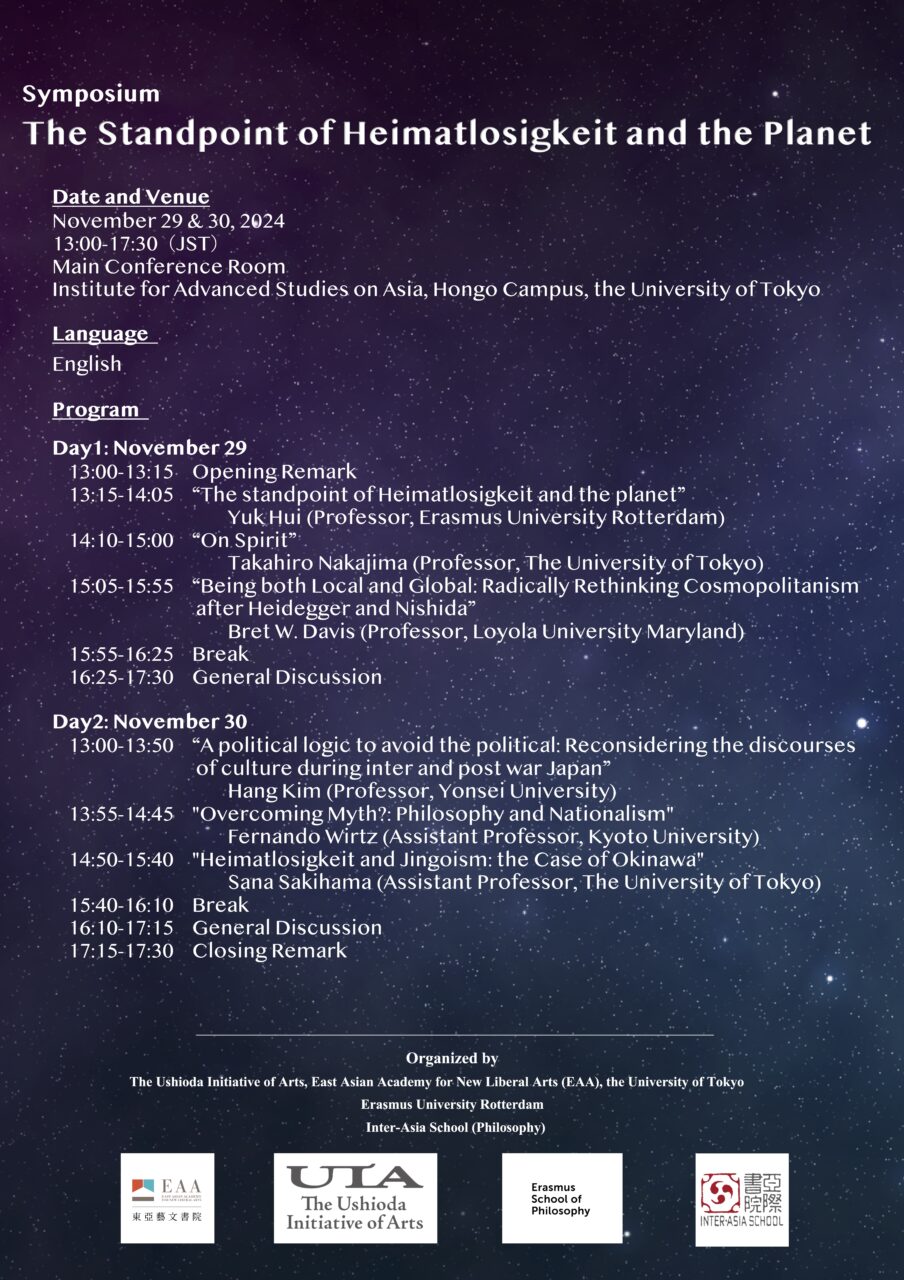Symposium “The Standpoint of Heimatlosigkeit and the Planet”
During the outbreak of the Second World War in 1941 and 1942, four philosophers and historians affiliated with the Kyoto School participated in three symposiums organized by the literature magazine Chūō Kōron. The first symposium, titled ‘The Standpoint of World History and Japan,’ positioned Asia against Europe and advocated for Japan’s historical role in reshaping world history and overcoming Western decadence in view of the decline of the Occident. This narrative purportedly justified Japan’s military activities in Asia. The subsequent year (1942) saw the convening of a symposium titled “Overcoming Modernity” by Bungakukai, featuring participation from philosophers, historians, and critics of music and literature, in which Western modernity is posed as a problem to be resolved. The Kyoto School philosophy fell out of favor in the post-war philosophical landscape, only resurfacing in the past decade with growing international interest. While the legacies of the Kyoto School and the “Overcoming Modernity” movement warrant attention, they must be contextualized within a historical process that demands reassessment today; in other words, we have to overcome the “Overcoming Modernity” in order to shed light on distinct paths toward the future.
Today, we are witnessing the consequences of another historical process: planetarization. Unlike the desire for the consciousness of world history starting from Hegel to Kojève and further, we are now called to a planetary consciousness. Since the launch of Sputnik in 1957, it has become impossible to comprehend the world solely from the perspectives of Hegel’s Berlin or Kojève’s Paris, even though nation-states continue to grapple with their obsolescence. The modern individual is becoming increasingly displaced or disoriented, a predicament foreseen by Martin Heidegger in his “Letter on Humanism” (1946): “Die Heimatlosigkeit wird ein Weltschicksal (Homelessness will be a destiny of the world).” Modern individuals are experiencing a sense of homelessness due to planetarization (formerly referred to as globalization, often seen as a milestone marking the end of history), a process of homogenization that, coupled with the exploitation of natural and human resources, manifested in extractionism and real estate speculation, inevitably leads to exhaustion.
The theme of “Overcoming Modernity” has resurfaced repeatedly, particularly in recent decades, echoing the “ontological turn” movement associated with anthropologists such as Bruno Latour and Philippe Descola, as well as the critique of the Anthropocene. Additionally, it has become intertwined with reactionary politics largely fuelled by an ideological war between the East and the West. In this symposium, we propose a shift in our standpoint from a world history oriented towards the Absolute or the concrete universal to one that acknowledges inevitable homelessness, and from the standpoint of a nation-state to that of the planet. This new situation necessitates a renewed framework for understanding the planetary condition, prompting an actualization and critique not only of Kyoto School philosophy but also philosophy in general: What might philosophy’s responses be to the current planetary condition? How might Asian thought contribute to this reflection on the planetary?
Date
13:00-17:30(JST), November 29 & 30, 2024
Venue
Main Conference Room, Institute for Advanced Studies on Asia, Hongo Campus, the University of Tokyo
Language
English
Program
Day1 November 29
13:00-13:15 Opening Remark
13:15-14:05 “The standpoint of Heimatlosigkeit and the planet” (Yuk Hui/Professor, Erasmus University Rotterdam)
14:10-15:00 “On Spirit” (Takahiro Nakajima/Professor, The University of Tokyo)
15:05-15:55 “Being both Local and Global: Radically Rethinking Cosmopolitanism after Heidegger and Nishida” (Bret W. Davis/Professor, Loyola University Maryland)
15:55-16:25 Break
16:25-17:30 General Discussion
Day2 November 30
13:00-13:50 “A political logic to avoid the political: Reconsidering the discourses of culture during inter and post war Japan” (Hang Kim/Professor, Yonsei University)
13:55-14:45 ”Overcoming Myth?: Philosophy and Nationalism” (Fernando Wirtz/Assistant Professor, Kyoto University)
14:50-15:40 ”Heimatlosigkeit and Jingoism: the Case of Okinawa” (Sana Sakihama/Assistant Professor, The University of Tokyo)
15:40-16:10 Break
16:10-17:15 General Discussion
17:15-17:30 Closing Remark
Organized by
The Ushioda Initiative of Arts, East Asian Academy for New Liberal Arts (EAA), the University of Tokyo
Erasmus University Rotterdam
Inter-Asia School (Philosophy)









